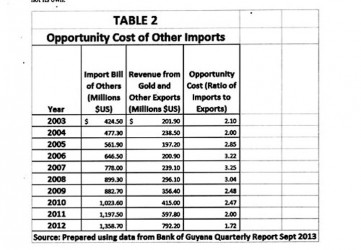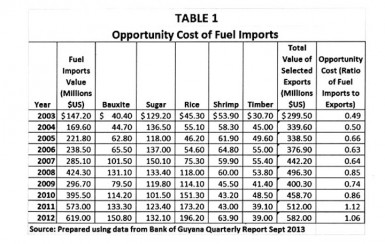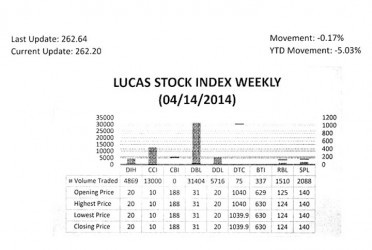Forty-seven years ago this month Martin Luther King Jr. uttered the words:
“We are now faced with the fact, my friends, that tomorrow is today. We are confronted with the fierce urgency of now… Life often leaves us standing bare, naked, and dejected with a lost opportunity”.
Foundation for sustainability
When Martin Luther King Jr mentioned those words he was not speaking about Guyana. He was speaking to his nation, the United States of America (USA), which he was seeking to persuade to abandon what he saw as an unjust war in Vietnam in favour of fixing the injustices of civil rights at home. But for this nation of less than one million, those words ring true today in the face of the surreal economic development that has occurred over the last seven years without real prospects or foundation for![]() sustainability and the lost opportunity for cheaper energy. Guyanese must be reminded that the current economic success derives not from any strategic policy position of this administration, but from fortuitous global economic circumstances that have allowed gold prices to remain exceptionally high for the past seven years and the determination of their fellow Guyanese to see, through remittances, that their loved ones did not suffer in their absence. Also, this nation must not discount the impact on economic growth of the generosity of its many creditors who showed kindness in writing off a substantial portion of Guyana’s debt, thus leaving most of its export revenue intact to spend on other development necessities.
sustainability and the lost opportunity for cheaper energy. Guyanese must be reminded that the current economic success derives not from any strategic policy position of this administration, but from fortuitous global economic circumstances that have allowed gold prices to remain exceptionally high for the past seven years and the determination of their fellow Guyanese to see, through remittances, that their loved ones did not suffer in their absence. Also, this nation must not discount the impact on economic growth of the generosity of its many creditors who showed kindness in writing off a substantial portion of Guyana’s debt, thus leaving most of its export revenue intact to spend on other development necessities.
Paying a heavy price
After 48 years of independence, Guyana is still a factor-driven economy. It relies essentially on the export of raw materials to earn money to conduct its business. Those raw materials contain much more value than that received from their export. If processed, they expand opportunities to add value and create jobs. Guyanese know that for this country to move forward and realize its full potential, it must have access to cheap energy. The country is already paying a heavy price to maintain the economic growth which it has unexpectedly enjoyed over the past seven years. The opportunity cost of fuel imports is the total value of exports which is given up each year to pay the energy bill. It remains that Guyana depends on revenues from rice, sugar, timber, shrimp, bauxite and gold to keep the wheels of industry fully fuelled. But, a look at the two tables below shows that the country’s capacity to do so is waning since the revenues from key exports are not growing fast enough to keep up with the demand for, and fluctuating price of, fuel.
Table 1 below shows that in 2003 less than half of the revenues from our principal exports were used to pay our energy bill. That cost rose progressively from 2004, varying periodically along the way, and reaching 112 per cent in 2011 before falling back to 106 per cent in 2012. It leaves gold, rum, molasses and the export of a few other commodities to pay the rest of the import bill.
A diversified economy
 From ever long, it is known that the only thing that could increase the likelihood of sustained economic success is a diversified economy, since it is the one thing that increases the chance that the current growth could continue without Guyana having to tie its fortunes exclusively to the vicissitudes of raw material prices and commodity demands. Diversification carries with it the benefit of keeping the economy in balance during good and bad times. When one sector is down, the slack could be picked up by another sector. Also, diversification increases the readiness of the economy to create economic opportunities or to take advantage of them when they come along.
From ever long, it is known that the only thing that could increase the likelihood of sustained economic success is a diversified economy, since it is the one thing that increases the chance that the current growth could continue without Guyana having to tie its fortunes exclusively to the vicissitudes of raw material prices and commodity demands. Diversification carries with it the benefit of keeping the economy in balance during good and bad times. When one sector is down, the slack could be picked up by another sector. Also, diversification increases the readiness of the economy to create economic opportunities or to take advantage of them when they come along.
Further, the processing of raw materials and commodities helps to increase the value-added and thereby increase incomes. A robust and expanded manufacturing sector would be the most glaring evidence of a diversified Guyanese economy, and that possibility depends on the availability of cheap energy. The administration must therefore act to bring cheap energy to Guyana so that the economy could grow through investment and trade without falling prey to the narrow economic vision associated with mercantilists.
From Table 2, it could be seen that collectively, the rest of the exports is unable to cover the import bill of all the other things that Guyana buys from abroad. On average, the import bill is two and a half times greater than the revenues earned from the export of the latter group of commodities. So, notwithstanding all the foreign goods seen in the markets and shops, and the many artistes who come to perform, the opportunity cost tells us that Guyana borrows plenty money from foreigners to pay the bills for those goods and services that Guyanese enjoy at home. With the import bill rising, the fate of this nation continues to be in the hands of others, not its own.
Cooperation and Compromise
 No one who has the integrity of the nation at heart can ignore the continuous unavailability of cheap electricity and what it means to the future economic success of the nation. Yet, in the unfolding conundrum of life in Guyana, the wisdom of cooperation and compromise for cheap energy remains elusive as it is with almost every other thing. There is comprehension of the need for cheap energy but a lack of understanding of the moment for its occurrence. Such actuality is no more evident than in the Amaila Falls debacle where the chance for cheaper electricity was within grasp of reality but Guyanese let it slip away. Without cheap energy, Guyana would find it difficult to compete in the global economy and its economic expansion would always remain primarily at the mercy of the rate and condition of the international economic environment.
No one who has the integrity of the nation at heart can ignore the continuous unavailability of cheap electricity and what it means to the future economic success of the nation. Yet, in the unfolding conundrum of life in Guyana, the wisdom of cooperation and compromise for cheap energy remains elusive as it is with almost every other thing. There is comprehension of the need for cheap energy but a lack of understanding of the moment for its occurrence. Such actuality is no more evident than in the Amaila Falls debacle where the chance for cheaper electricity was within grasp of reality but Guyanese let it slip away. Without cheap energy, Guyana would find it difficult to compete in the global economy and its economic expansion would always remain primarily at the mercy of the rate and condition of the international economic environment.
Responsibility of executive
Under the separation of powers, it is the responsibility of the executive arm of government to make cheap electricity happen. Executive leadership imposes that obligation on the government and it did not make it happen. Who would have thought that, with such awareness, provincial politics would secure ascendancy over a national economic priority that was a decision away from coming to fruition? This government is mesmerized by stubbornness and appears to seek out every opportunity to display it. The evidence continues to accumulate with the unwillingness to establish the Public Procurement Commission (PPC), the unwillingness to enable the Integrity Commission (IC) to operate, the unwillingness to strengthen the anti-money laundering institutions, the unwillingness to activate the Public Service Commission (PSC) and the Public Service Appellate Tribunal. But, alas, the demise of the Amaila Falls project would remain one of its biggest and most glaring failures.
One would think that lessons were learnt from the Amaila Falls debacle, but the government showed no interest in casting aside its obduracy as it rejected tripartite consultations on the 2014 budget and engaged in the manipulation of the economic hopes of every indigenous community, every household, every small business owner, in fact, every Guyanese who yearns for more not less information, with the latest budget opportunity that came around.
Need new spirit
We need a new spirit to rise from among us to confront the demons that are happy to let this country talk about its potential but never realize it. Guyana was so close a year ago to advancing towards an era of cheaper electricity. But, the shadow of resentment kept following this nation around. It should not be the privilege of anyone to believe that he or she has the right to restrain the ambitions and decisions of Guyanese. That keeps happening with every failure to reach legislative compromise or every decision not to assent to the will of the people reflected in the majority parliamentary outcomes. The new spirit must reflect the determination of this nation to overcome its inner divisions, its willingness to accept the shared sacrifices of those who have struggled to bring it to where it is today.
 Our government needs to know that policies that produce excessive amounts of unreported income, excessive amounts of unsolved crimes, excessive amounts of judicial injustice, excessive amounts of waste, and excessive amounts of vulgarity are not the preferred choice of Guyanese. Though they might create many moments of self-gratification, none of these outcomes have any logic in economics and leave our social and economic development in the hands of undesirables. At this Easter time, the moral compass of the nation needs to be recalibrated if the privileges of the crooked and criminal are to be taken away and this nation is to regain control over its economic future. Guyanese must be concerned therefore about the mad quest for money and materialism at all costs that has subordinated the nation’s drive for economic independence to the passions of personal comforts and political complacency so evident in this country today, and have rendered our public institutions as conveniences of the criminals and the well-protected.
Our government needs to know that policies that produce excessive amounts of unreported income, excessive amounts of unsolved crimes, excessive amounts of judicial injustice, excessive amounts of waste, and excessive amounts of vulgarity are not the preferred choice of Guyanese. Though they might create many moments of self-gratification, none of these outcomes have any logic in economics and leave our social and economic development in the hands of undesirables. At this Easter time, the moral compass of the nation needs to be recalibrated if the privileges of the crooked and criminal are to be taken away and this nation is to regain control over its economic future. Guyanese must be concerned therefore about the mad quest for money and materialism at all costs that has subordinated the nation’s drive for economic independence to the passions of personal comforts and political complacency so evident in this country today, and have rendered our public institutions as conveniences of the criminals and the well-protected.
LUCAS STOCK INDEX
The Lucas Stock Index (LSI) declined 0.17 percent during the second period of trading in April 2014. The stocks of eight companies were traded with a total of 59,999 shares changing hands. There was one Climber and two Tumblers. The value of the stocks of Guyana Bank for Trade and Industry (BTI) rose 0.16 percent on the sale of 337 shares while the value of the stocks of Demerara Tobacco Company (DTC) fell 0.01 percent on the sale of 75 shares. The value of the stocks of Republic Bank Limited (RBL) also fell 0.80 percent on the sale of 1,510 shares. In the meanwhile, the value of the stocks of Banks DIH (DIH), Caribbean Container Inc., Demerara Bank Limited (DBL), Demerara Distillers Limited (DDL), and Sterling Products Limited (SPL) remained unchanged on the sale of 4,869; 13,000; 31,404; 5,716 and 2,088 shares respectively.
Not to succumb
The new attitude must reflect also the determination not to succumb to the vulgar demands of greed, illiteracy, laziness and indecision. In every decision that we make we must show that we have conquered these tendencies and the racial demon that have invaded our civil space and thwarted our best intentions. As we pursue cheaper energy, that is the tomorrow Guyanese must confront today. That must be part of the fierce urgency of now, for if we wait, we would be clinging to an undesirable and intolerable future.
Happy Easter!









